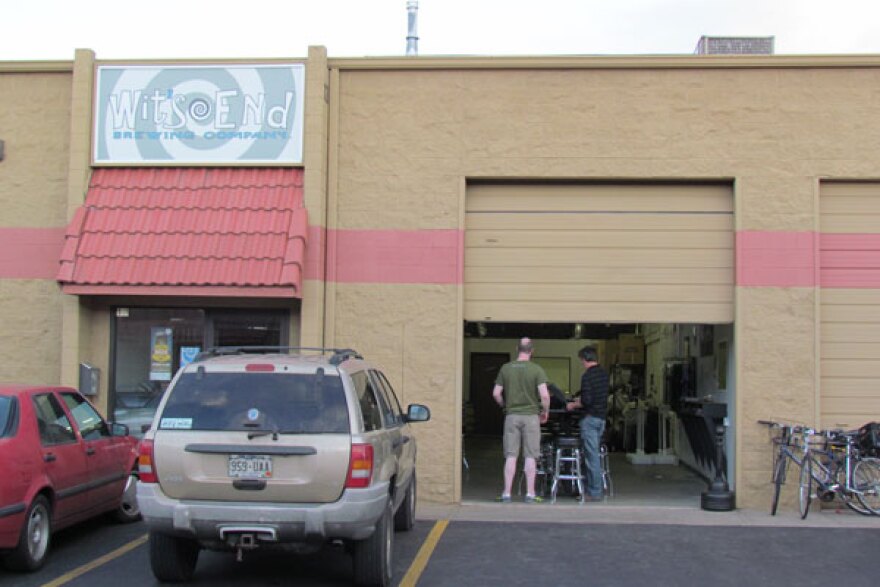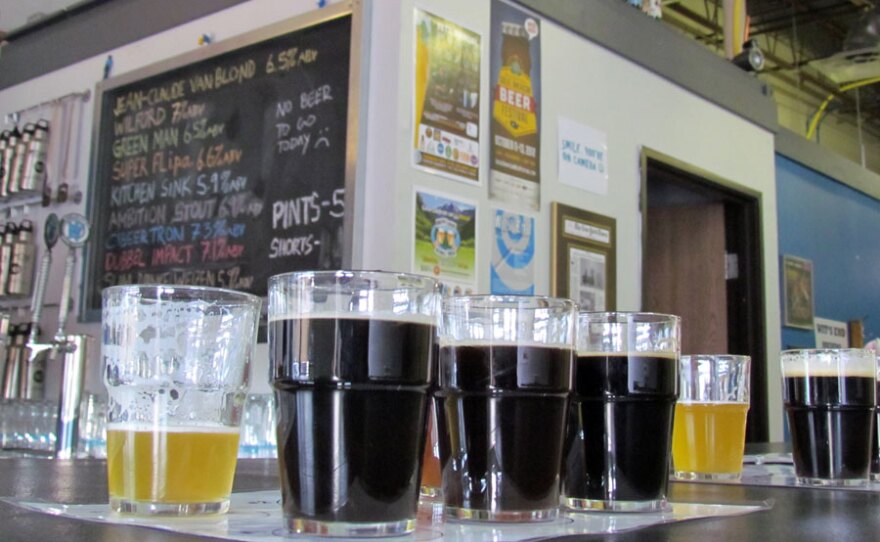Billed as the worldŌĆÖs largest commercial beer competition, the gets underway Thursday in Denver.
This year the GABF sold out all of its nearly 50,000 tickets in less than an hour, emblematic of a broader boom, thatŌĆÖs going on within the craft beer industry according to Julia Herz of the Boulder-based .
ŌĆ£Things are on fire right now for breweries in planning, we actually have 1,300 breweries in planning in the US that weŌĆÖve recorded right now, on top of the 2100 breweries that are in existence.ŌĆØ
With , we got to wondering how new breweries try to stand out in a market thatŌĆÖs becoming increasingly crowded?
As it turns out, some brewers are staying competitive by entering the market as hyper-local.
Going ŌĆ£NanoŌĆØ
Scott Witsoe scoops up a heavy sack of oats and hoists it over his shoulders.
ŌĆ£These are the kinds of things you do as a nano,ŌĆØ he says.
ThatŌĆÖs nano, as in nano-brewer.
When Witsoe was laid off from his job last year, he decided to take his passion for home brewing and go commercial, opening up his , his new full-time job.
WitŌĆÖs End is housed in this converted garage in a remote warehouse area south of downtown Denver.

No frills, just how Witsoe likes it.
ŌĆ£For me, I thought, why canŌĆÖt a brewery be like your corner bakery, or your corner meat shop,ŌĆØ he says. ŌĆ£Why does it have to be at this grand scale.ŌĆØ
The term nano-brewery is so new defining it is a work-in-progress. But Witsoe and others in this emerging sector have collectively agreed a ŌĆ£nanoŌĆØ is one that has a brewing capacity of just three barrels or less, that is, there are never more than about two kegs of a particular beer on hand and ready to sell at once.
Running a beer operation this small has its downsides for sure, says Witsoe. But at the same time, he canŌĆÖt imagine being a larger craft brewery with investors behind him.
ŌĆ£I also have very specific beers I want to make, a very specific thing I want to do,ŌĆØ he says. ŌĆ£ItŌĆÖs hard to always articulate that, and for me to be able to have a small system that I can play with, to not have to take on investors and do any of that, I can just sort of do it my way.ŌĆØ
Crowd Pleaser

One of those ŌĆ£specificŌĆØ beers is the Wilford, WitsoeŌĆÖs take on a Belgian-style Oatmeal IPA, one of several experimental beers heŌĆÖs entering in this weekŌĆÖs Great American Beer Festival.
The beer has gotten quite popular with his customers in the tap room up front, for now, the only place around town where you can drink it.
ŌĆ£The less refined the physical space, the better the beer,ŌĆØ says customer Harneet Sethi. ŌĆ£Maybe thatŌĆÖs not a true rule, but I go by that theory because theyŌĆÖre focusing their energy on the beer.ŌĆØ
Sethi and his friend Mark Dziedzic happened upon WitŌĆÖs End while visiting town from New England this week where they are both home-brewers.
ŌĆ£I think it will take off, because this is how it used to be, every city had their own beers,ŌĆØ says Dziedzic. ŌĆ£You had Germany, little towns where thereŌĆÖs little breweries, so I can see neighborhoods having their own beers.ŌĆØ
The Local Beer Movement
In many ways, the phenomenon fits right in with the theme of the localization of beer.
ŌĆ£Because theyŌĆÖre mainly only selling to their backyard network,ŌĆØ says Julia Herz of the Brewers Association, which now counts about 300 nano-breweries among its members.
Herz says itŌĆÖs an appealing business model for many up and coming brewers. ThereŌĆÖs not a lot of overhead or capital needed, and many build off of some of the home brewing equipment theyŌĆÖve already acquired.
ThatŌĆÖs how many ŌĆ£heritageŌĆØ craft brewers such as in Delaware or in Fort Collins got their start, after all.
ŌĆ£[They] started as very small breweries, delivering one case at a time and brewing one batch at a time and then they grew,ŌĆØ Herz says. ŌĆ£It all depends on the business model of the brewer.ŌĆØ
ŌĆśThe Oscars of BeersŌĆÖ

Wits End owner Scott Witsoe isnŌĆÖt ruling out an expansion, but for now, he just seems to be savoring his early success.
The brewery just celebrated its one year anniversary. And another milestone came recently when Witsoe decided he needed to hire an employee to run his tap room and help out with brewing.
Sales are continuing to rise.
ŌĆ£ItŌĆÖs so surreal to me, I never thought I would be the type of person that would actually employ someone,ŌĆØ Witsoe says. ŌĆ£It still sounds kind of formal when IŌĆÖm looking over the payroll and signing checks.ŌĆØ
Also surreal for Witsoe, this year he wonŌĆÖt just be going to the Great American Beer Festival, heŌĆÖs competing. Nano-breweries donŌĆÖt have their own category, so that Oatmeal IPA will go head to head against the big boys like New Belgium.
But even if he doesnŌĆÖt win, Witsoe says the exposure alone is worth the price of admission to the Oscars of Beer.












